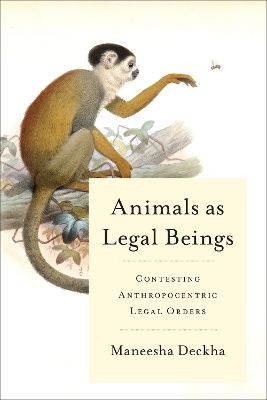
Animals as Legal Beings
Contesting Anthropocentric Legal Orders
Seiten
2021
University of Toronto Press (Verlag)
978-1-4875-2587-3 (ISBN)
University of Toronto Press (Verlag)
978-1-4875-2587-3 (ISBN)
In the ongoing quest to protect animals from exploitation, this book discusses "beingness," as an alternative to "personhood," as the more impactful and animal-centered legal status that recognizes and values animals for who they are.
In Animals as Legal Beings, Maneesha Deckha critically examines how Canadian law and, by extension, other legal orders around the world, participate in the social construction of the human-animal divide and the abject rendering of animals as property. Through a rigorous but cogent analysis, Deckha calls for replacing the exploitative property classification for animals with a new transformative legal status or subjectivity called "beingness."
In developing a new legal subjectivity for animals, one oriented toward respecting animals for who they are rather than their proximity to idealized versions of humanness, Animals as Legal Beings seeks to bring critical animal theorizations and animal law closer together. Throughout, Deckha draws upon the feminist animal care tradition, as well as feminist theories of embodiment and relationality, postcolonial theory, and critical animal studies. Her argument is critical of the liberal legal view of animals and directed at a legal subjectivity for animals attentive to their embodied vulnerability, and desirous of an animal-friendly cultural shift in the core foundations of anthropocentric legal systems.
Theoretically informed yet accessibly presented, Animals as Legal Beings makes a significant contribution to an array of interdisciplinary debates and is an innovative and astute argument for a meaningful more-than-human turn in law and policy.
In Animals as Legal Beings, Maneesha Deckha critically examines how Canadian law and, by extension, other legal orders around the world, participate in the social construction of the human-animal divide and the abject rendering of animals as property. Through a rigorous but cogent analysis, Deckha calls for replacing the exploitative property classification for animals with a new transformative legal status or subjectivity called "beingness."
In developing a new legal subjectivity for animals, one oriented toward respecting animals for who they are rather than their proximity to idealized versions of humanness, Animals as Legal Beings seeks to bring critical animal theorizations and animal law closer together. Throughout, Deckha draws upon the feminist animal care tradition, as well as feminist theories of embodiment and relationality, postcolonial theory, and critical animal studies. Her argument is critical of the liberal legal view of animals and directed at a legal subjectivity for animals attentive to their embodied vulnerability, and desirous of an animal-friendly cultural shift in the core foundations of anthropocentric legal systems.
Theoretically informed yet accessibly presented, Animals as Legal Beings makes a significant contribution to an array of interdisciplinary debates and is an innovative and astute argument for a meaningful more-than-human turn in law and policy.
Maneesha Deckha is a professor and Lansdowne Chair in Law at the University of Victoria.
Moving Toward a Non-Anthropocentric Legal Status for Animals
1. No Escape: Anti-Cruelty Law’s Property Foundations
2. What’s Wrong with Personhood?: The Humanizing Impact of Anthropos
3. Toward a Post-Anthropocentric Legal Ontology
4. Beingness: A New Legal Subjectivity for Animals
5. Liberal Humanism Repackaged?
6. Conclusion
| Erscheinungsdatum | 10.05.2021 |
|---|---|
| Verlagsort | Toronto |
| Sprache | englisch |
| Maße | 152 x 229 mm |
| Gewicht | 460 g |
| Themenwelt | Recht / Steuern ► Allgemeines / Lexika |
| Recht / Steuern ► EU / Internationales Recht | |
| Sozialwissenschaften ► Ethnologie | |
| Sozialwissenschaften ► Soziologie | |
| ISBN-10 | 1-4875-2587-7 / 1487525877 |
| ISBN-13 | 978-1-4875-2587-3 / 9781487525873 |
| Zustand | Neuware |
| Informationen gemäß Produktsicherheitsverordnung (GPSR) | |
| Haben Sie eine Frage zum Produkt? |
Mehr entdecken
aus dem Bereich
aus dem Bereich
Sammlung des Zivil-, Straf- und Verfahrensrechts, Rechtsstand: 7. …
Buch | Hardcover (2025)
C.H.Beck (Verlag)
49,00 €
Klausuren, Hausarbeiten, Seminare, Bachelor- und Masterarbeiten
Buch | Softcover (2021)
C.H.Beck (Verlag)
12,90 €


